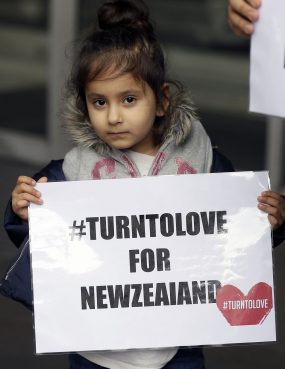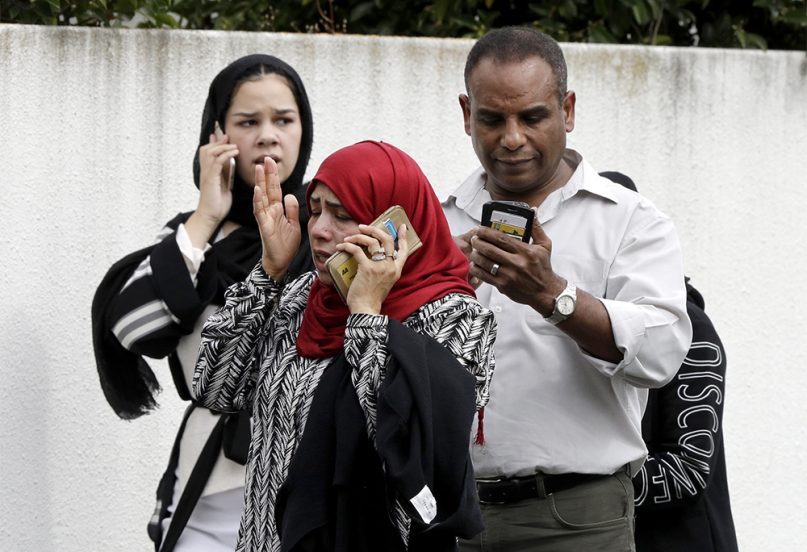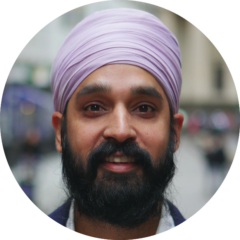(RNS) — It wasn’t until I dropped my daughter off at preschool this morning that I pulled out my phone and saw the horrific news about last night’s shooting in Christchurch, New Zealand.
And like most people, I imagine, my heart sank right through my stomach and down into the floor beneath me. Forty-nine innocent people. Praying together. Worshipping in community. Assuming they were safe. Gunned down in cold blood.
My heart was paralyzed with pain, and I took a seat in the preschool lobby.
And that’s when my mind began racing. I thought of my daughter and the kids in her class, a group of three-year-olds painting rainbows and playing with dinosaurs. Would they be safe?
I thought of the pain I felt when a white supremacist massacred Sikh congregants in Wisconsin a few years back. My brother and sister-in-law were there at the time, and we had no idea if we would ever see them again.
At that time, I didn’t have kids. And now that I do, as I sat there, my heart began aching, imagining how painful it must be for the parents who lost their loved ones in New Zealand. Forty-nine sons and daughters – who would never come home.
Before I knew it, my legs picked me up off the couch and carried me back to my daughter’s classroom. I peered through the window, resisting the urge to go in, grab her by the hand, and take her home.
I didn’t fear for myself, but I am terrified for her. If I really loved her, wouldn’t I want to protect her from the madness of our world? Wouldn’t the loving move be to lock her in our apartment and make sure she never has to experience hate in any of its pernicious forms? Isn’t the role of a loving parent to protect their kids from pain?
The kids were hugging each other now. My daughter had made a card for her friend and pulled it out of her cubby when she arrived. She also pulled out her beloved stuffed unicorn and shared it with one of her friends.
I reflected on the moment, realizing that all she knows is love. Her friend thanked her for sharing the unicorn by giving her a hug.
“O, to return to the innocence of a child,” I thought.

A young demonstrator holds a banner from multi-faith group ‘Turn to Love’ during a vigil at New Zealand House in London, Friday, March 15, 2019. (AP Photo/Kirsty Wigglesworth)
My mind returned to New Zealand.
How is it possible that our sweet, innocent three-year-olds could ever become hateful? They certainly don’t know it as children. So where do they learn it? What have we done as a society that transforms our children’s love into toxic hate? And is there anything we can do to inoculate them?
I ask myself these questions every day as a father. I’ve been on the other side of hate. My family and I have been attacked because of how we look often enough to know that it’s a disease that, if allowed to fester, spreads like wildfire.
And like wildfire, it consumes everything in its path, leaving nothing but scorched remains. There’s no predicting where it will go, which means that no one is immune. And even those who manage to survive are rendered infertile for years — it takes years to “recover.” Nothing is ever fully the same again.
I know in my heart that I can’t protect my daughter from being a target of hate. Although I don’t live in fear of potential violence, I’m pragmatic enough to recognize that none of us is fully safe, no matter how comfortable our lives are. Not with the rise of supremacy and extremism all across the world. We can, however, minimize that risk. And my wife and I do everything in our power to ensure physical security.
Physical safety is something all parents think about, from rounding table corners when infants learn to walk to teaching young kids about stranger danger and looking both ways before crossing the street.
But how many of us truly think about how we want to protect our children from internalizing the disease of hate? What are we actually doing to preserve the loving innocence of our children so that they never fall prey to hateful ideologies?
As a father, I want nothing more in this world than for my two girls to be happy. And the more I think about it, the more I am convinced that the solution is not to keep them away from the ugly realities of the world. That hasn’t worked in the past, and it’s not going to work for her.
Instead, the solution is equipping her with the worldview and the values that she will need to navigate the messiness of reality as she encounters it in her life. In educational models, this is called scaffolding. You lay a strong foundation upon which you can layer abilities and skills that result in overall growth.
Isn’t this precisely what we ought to be doing for our children’s emotional and spiritual beings?
The first step we are taking with her is one that is specific to the Sikh faith but also universal for all people. One of the first things that every Sikh child learns — including my own — is that the same divine light exists in everyone equally. If we all share that same light, how can we say that anyone is better than anyone else?
My three-year-old understands this concept, and as I watch the kids in her class play together, it seems to me that this is more intuitive to them than it is to us. Somehow, we have been socialized to believe otherwise. We must re-lay our foundations. We all need emotional and spiritual scaffolding.
And, again, if I truly want to be happy, I want to reinforce this so deeply in my two girls that they never lose this perspective. People might disrespect you, mistreat you, or even hate you — but returning hate with more hate will only compromise your own soul. And it will consume you.
Stand up for yourself and stand up for what’s right. But do that out of love. Not spite.
There is no magic potion that will cure our society from the disease of hate. We have to change our culture — and that takes work. We need to re-lay our foundations with worldviews and values that prioritize love and oneness. We need to scaffold skills and abilities to navigate hate when we encounter it in the world around us. We have to learn to react, not with our emotions of anger or frustration or rage — but with the same kind of love that three-year-olds show one another while play-fighting with dinosaurs.
We can’t fully inoculate ourselves from hate, but we can gird ourselves with the weapons to combat it. If not for ourselves, then at least for our children.






